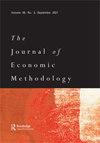遗传彩票为什么DNA对社会平等至关重要,凯瑟琳·佩奇·哈登著,普林斯顿,普林斯顿大学出版社,2021年,312页,29.95美元/ 25.00英镑,ISBN: 9780691226705
IF 1.8
3区 经济学
Q2 ECONOMICS
引用次数: 0
摘要
注1在人类行为遗传学中,通常通过比较同卵(同卵)双胞胎与异卵(“异卵”)同性双胞胎的相似性来计算遗传力,假设这对双胞胎将经历(大致)相同的发育环境,因此同卵双胞胎的任何过度相似性必然与他们的过度遗传相似性有关。对于这种方法及其基础假设的批评,请参见例如Joseph, Citation2014。虽然我对人类行为特征的遗传性估计的准确性持怀疑态度(参见马修斯和图克海默,Citation2022对遗传性估计可能不准确的一些方式的回顾),但我自己的观点是,该概念的基本局限性通常使关于其准确性的争论变得毫无意义(参见卡普兰,Citation2006,讨论)我想指出,我不支持这种政策,而我想要远程在社会中,每个人都能这样做,任何渴望能够参加,从大学毕业,而不会不合理的成本,我不认为这是必要的,每个人都能这样做实际上想要这么做,并希望任何合理公正的社会将创建/保存空间(有意义,(对那些没有大学学历的人来说,高薪的工作)不过,哈登再次夸大了她的观点。有证据表明,在基因上与早期有性行为的儿童(在特定的社会环境中等)更相似的儿童,在不良后果方面也更可能相似,但从那里转移到“加速生殖发育的基因”充其量是一种延伸我拒绝引用这篇“论文”,因为这样做有可能使它和它出现的“期刊”合法化——我相信有兴趣阅读这篇“论文”的读者会毫不费力地找到它。本文章由计算机程序翻译,如有差异,请以英文原文为准。
The genetic lottery why DNA matters for social equality The genetic lottery why DNA matters for social equality , by Kathryn Paige Harden, Princeton, Princeton University Press, 2021, 312 pp., $29.95/£25.00, ISBN: 9780691226705
Click to increase image sizeClick to decrease image size Notes1 In human behavior genetics, heritability is usually calculated by comparing the similarity of monozygotic (identical) twins to that of dizygotic (“fraternal”) same-sex twins, under the assumption that such sets of twins will have experienced (roughly) the same developmental environments, and so any excess similarity in identical twins must be associated with their excess genetic similarity. For a critique of this methodology and the assumptions underlying it, see e.g. Joseph, Citation2014. While I am skeptical of the accuracy of heritability estimates in human behavioral traits (see Matthews & Turkheimer, Citation2022 for a review of some of the ways in which heritability estimates can be inaccurate), my own view is that the concept’s fundamental limitations usually make arguments about its accuracy moot (see Kaplan, Citation2006, for discussion).2 I want to note that I am not endorsing such a policy – while I would like to be in a society in which everyone remotely capable of doing so and with any desire to do so be able to attend and graduate from college without incurring unreasonable costs, I don’t think it is imperative that everyone capable of doing so in fact want to do so, and would hope that any reasonably just society would create / hold space (meaningful, well-paid work) for people for whom pursuing a college education was not attractive.3 Though again, Harden overstates her case. The evidence suggests that children who are more genetically similar to children who engage in early sexual behavior (within a particular social context, etc.) are also more likely to be similar in terms of adverse outcomes, but the move from there to “genes that accelerate reproductive development” is a stretch, at best.4 I resist citing this “paper” as doing so risks legitimizing it and the “journal” in which it appears – readers interested in reading this “paper” will I trust have no trouble locating it.
求助全文
通过发布文献求助,成功后即可免费获取论文全文。
去求助
来源期刊

Journal of Economic Methodology
ECONOMICS-
CiteScore
3.20
自引率
8.30%
发文量
23
期刊介绍:
The Journal of Economic Methodology is a valuable forum which publishes the most current and exciting work in the broad field of economic methodology. The Journal of Economic Methodology addresses issues such as: ■Methodological analysis of the theory and practice of contemporary economics ■Analysis of the methodological implications of new developments in economic theory and practice ■The methodological writings and practice of earlier economic theorists (mainstream or heterodox) ■Research in the philosophical foundations of economics ■Studies in the rhetoric, sociology, or economics of economics
 求助内容:
求助内容: 应助结果提醒方式:
应助结果提醒方式:


